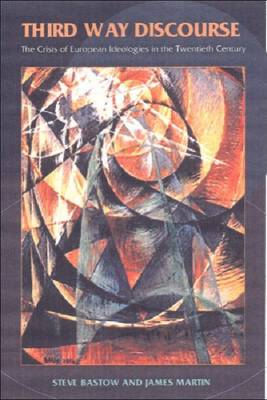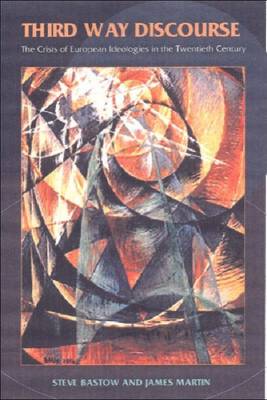
- Retrait gratuit dans votre magasin Club
- 7.000.000 titres dans notre catalogue
- Payer en toute sécurité
- Toujours un magasin près de chez vous
- Retrait gratuit dans votre magasin Club
- 7.000.000 titres dans notre catalogue
- Payer en toute sécurité
- Toujours un magasin près de chez vous
Third Way Discourse
European Ideologies in the Twentieth Century
Steve Bastow, James Martin
Livre broché | Anglais
47,45 €
+ 94 points
Description
The 'Third Way' has been hailed by European social democrats as the ideology of the 'radical centre'. Steering a route between state collectivism on the one hand, and market-led neo-liberalism on the other, it promises a new form of governance based on principle not dogma. But third way thinking is not a new phenomenon, and nor is it exclusively of the left. Similar ideas were developed throughout the twentieth century and across the political spectrum, from fascism to ecologism. This book introduces the history of third way ideology, surveys its various contrasting forms and locates it within the context of a recurrent crisis of modern European ideologies.The authors apply a theoretical approach that draws upon contemporary theories of discourse. Understood discursively, third way ideas seek to displace received ideological dichotomies and fashion a sense of common moral purpose and identity at times of accumulated social dislocation. Rather than focus narrowly on issues of public policy, Bastow and Martin analyse the third way as an ideological structure, highlighting in particular its rhetorical features and diverse forms.Features: *Draws upon contemporary post-structuralist discourse theory*Offers a new interpretive frame to understand the complexity and diversity of third way discourse*Includes chapters on New Labour, Italian Liberal Socialism, Ecologism, and Neo-Fascism *Explores the relationship between current third way theory and radical politicsThe aim of this book is to offer an informed introduction to the key variants of third way thinking in Europe as they have developed over the course of the 20th century, ranging from right to left on the political spectrum, thereby widening students' theoretical and historical understanding of current arguments within European Social Democracy.Key Features: *An alternative introduction to 20th-century European Political Theory*Includes chapters on New Labour, Italian Liberal Socialism, Ecol
Spécifications
Parties prenantes
- Auteur(s) :
- Editeur:
Contenu
- Nombre de pages :
- 192
- Langue:
- Anglais
Caractéristiques
- EAN:
- 9780748615612
- Date de parution :
- 15-05-03
- Format:
- Livre broché
- Format numérique:
- Trade paperback (VS)
- Dimensions :
- 161 mm x 233 mm
- Poids :
- 290 g







